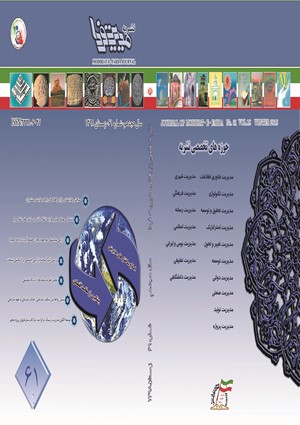شناسایی خدمات دانشی شرکت آب و فاضلاب استان قم
محورهای موضوعی :مریم قلی زاده 1 , محمد علی سرلک 2
1 - دانشگاه پیام نور
2 - دانشگاه پیام نور
کلید واژه: خدمات کسب و کار, خدمات کسب و کار دانشبنیان(کیبس), فرایند, فعالیت,
چکیده مقاله :
این پژوهش با هدف شناسایی خدمات دانشی شرکت آب و فاضلاب استان قم انجام شد. در این پژوهش که به روش دلفی انجام شد، پس از مرور پژوهشهای پیشین و بررسی اسناد بالادستی و زیرساختهای موجود در شرکت آبفا قم، حوزههای دانشی به همراه خدمات کسب و کار هر حوزه شناسایی گردید .نتایج حاصل از تجزیه و تحلیل دادهها نشان داد که حوزههای دانشی ایجاد، بهسازی و توسعه تاسیسات آب و فاصلاب ، راهبری، بهرهبرداری و نگهداشت تاسیسات ، فروش و خدمات مشترکین جهت بررسی به عنوان اولویت اول و مدیریت تامین و پشتیبانی، مدیریت منابع انسانی، مدیریت و تامین منابع مالی، مدیریت ارتباطات با ذینفعان، توسعه سیستمهای مدیریتی جهت بررسی در اولویت دوم قرار گرفت. همچنین فرایندها و فعالیتهای دانشی هر حوزه به تفکیک خدمات کسب وکار شناسایی و ارائه شد.
The purpose of this study was to identify knowledge Intensive Business Services of Qom Water and Wastewater Company. In this Delphi study, after reviewing previous research and examining the upstream documentation and infrastructure at ABFA, the areas of knowledge associated with a description of business services were identified. The results of data analysis showed that the areas of knowledge creation, upgrading and development of water and wastewater facilities, center of supervision, operation and maintenance of facilities, sales and customer service to be considered as a top priority and supply and support management, human resources management, management Financing, partner relationship management, developing management systems for review were the second priority. The processes and knowledge activities of each field were also identified and presented in separate business services.
Bettencourt, L., Ostrom, A., Brown, S., & Roundtree, R. (2002). Client co-production in knowledge-intensive business services. California Management Review, 44, 100–128
. Bowman, C., & Swart, J. (2007). Whose human capital? The challenge of value capture when capital is embedded. Journal of Management Studies, 44, 488–505
. Den Hertog, P. (2000). Knowledge-intensive business services as co-producers of innovation. International Journal of Innovation Management, 4, 491–528
. E. Muller, D. Doloreux. (2009). What we should know about knowledge intensive business services technology in Society 31 , 64–72
. Goldstein, S. M., Johnson, R., Duffy, J., & Rao, J. (2002). The service concept: The missing link in service design research. Journal of Operations Management, 20, 121–134
. Julius, D. (2008). Public Services Industry Review – Understanding the Public Services Industry: How big, how good, where next? London: Department for Business, Enterprise & Regulatory Reform (BERR) online at: http://www.berr.gov.uk/files/file6965.pdf
K. Pina, B.S. Tether .(2016). Towards understanding variety in knowledge intensive businessservices by distinguishing their knowledge bases Published by Elsevier B.V. 45, 401–413
. Kipping, M., & Kirkpatrick, I. (2013). Alternative pathways of change in professional services firms: The case of management consulting. Journal of Management Studies, 50, 777–807
Løwendahl, B. R. (1997). Strategic management of professional service firms. Copenhagen: Handel shøjskolens Forlag.
M.J. Mol, K. Brandl. (2017), Bridging what we know: The effect of cognitive distance on knowledge intensive business services produced offshore, International Business Review, online at:https://doi.org/10.1016/j.ibusrev.2017.11.003
Miles, I. (2008). Knowledge-Intensive Services. Manchester Business School, University of Manchester, UK
Miles, I.(1998). “Environmental Services and European Regulations” PREST mimeo (University of Manchester) presented at SPSG Conference at London School of Economics, Europeanisation and the Regulation of Risk, March 27 1998
Miles, I., (2005). ”Knowledge Intensive Business Services: Prospects and policies” Foresight vol 7 no 6 pp39-63
. Murray, J. Y., Kotabe, M., & Westjohn, S. A. (2009). Global sourcing strategy and performance of knowledge-intensive business services: A two-stage strategic fit model. Journal of International Marketing, 17, 90–105
. Schein, E. H. (1990). A general philosophy of helping: Process consultation. Sloan Management Review, 31(3), 57–64
. Shearmura, R., Doloreux, D., & Laperrièred, A. (2015). Is the degree of internationalization associated with the use of knowledge intensive services or with innovation? International Business Review, 24, 457–465
. Stabell, C. B., & Fjeldstad, Ø. D. (1998). Configuring value for competitive advantage: On chains, shops, and networks. Strategic Management Journal, 19, 413–437
. Starbuck, W. R. (1992). Learning by knowledge intensive firms. Journal of Management Studies, 29, 713–740
. Szulanski, G. (1996). Exploring Internal Stickiness: Impediments to the transfer of best practices within the firm. Strategic Management Journal, 17, 27–43
.


